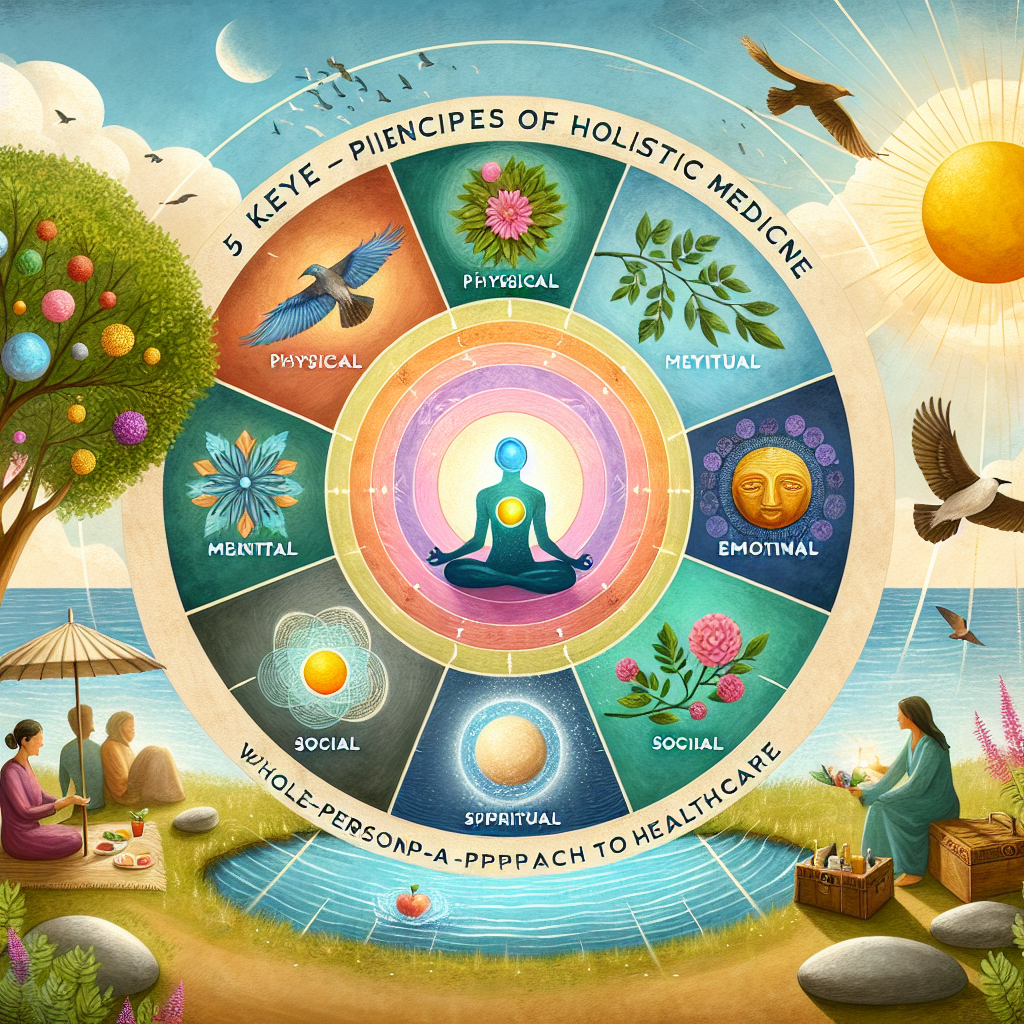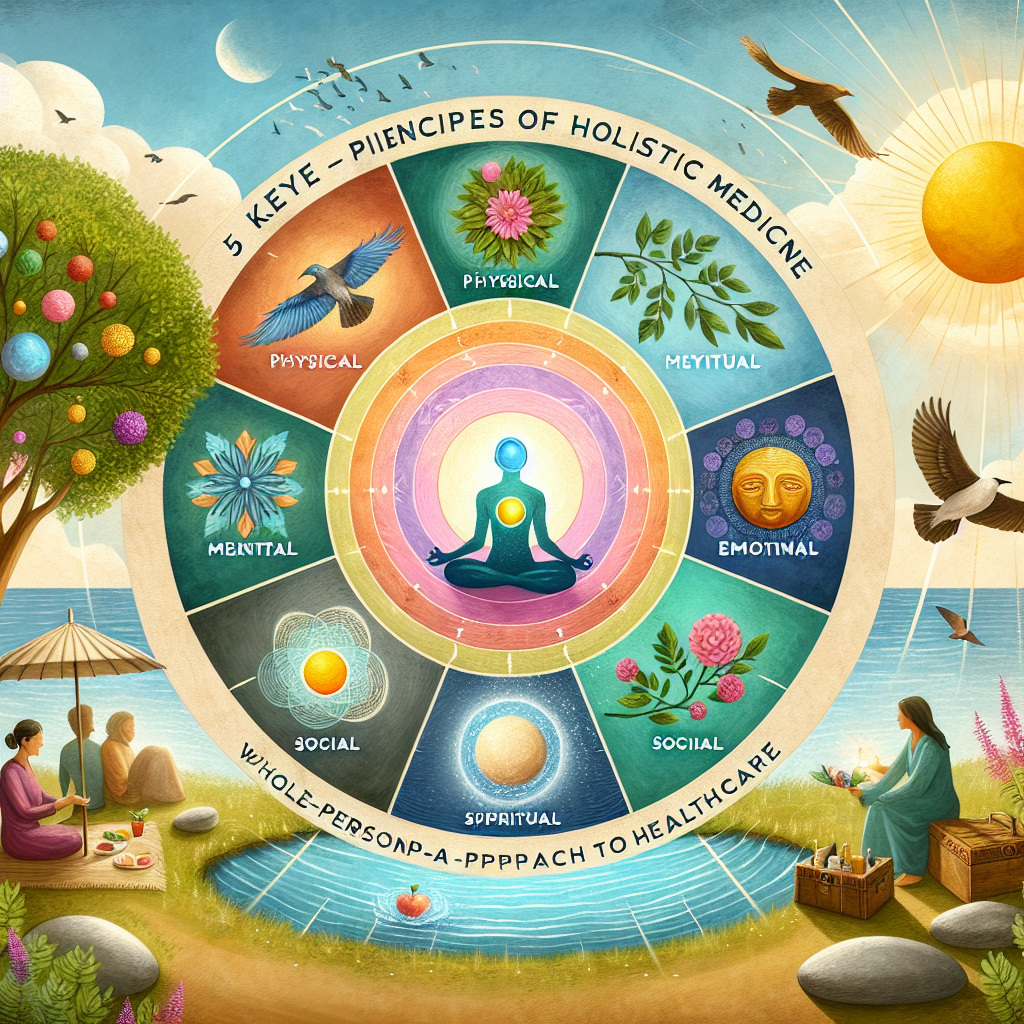In the world of healthcare, the practice of holistic medicine has gained significant attention and recognition. By considering the mind, body, and spirit as interconnected elements, holistic medicine aims to provide a comprehensive and personalized approach to healing and well-being. This article explores five key principles that underpin holistic medicine, shedding light on the importance of treating the whole person rather than just the symptoms. From addressing the root cause of an ailment to promoting self-care and prevention, these principles offer a holistic perspective that can empower individuals in their journey towards optimal health and vitality.
The Definition of Holistic Medicine
Holistic medicine is an approach to healthcare that focuses on treating the whole person, rather than just the symptoms of a specific illness or condition. It takes into consideration the physical, mental, emotional, and spiritual aspects of an individual, recognizing that these aspects are interconnected and influence overall well-being.
Understanding the Concept of Holism
The concept of holism is at the core of holistic medicine. It views the individual as a whole, where every part is interconnected and affects the others. In this approach, the focus is not only on treating the symptoms but also on identifying and addressing the underlying causes or imbalances that contribute to an individual’s health issues.
The Roots of Holistic Medicine
Holistic medicine has deep roots in ancient healing practices from different cultures around the world. Traditional Chinese Medicine, Ayurveda from India, and Native American healing traditions all emphasize the importance of a holistic approach to health and well-being. These ancient practices laid the foundation for the principles that guide holistic medicine today.
Principle #1: Treating the Whole Person
Addressing Physical, Mental, and Emotional Needs
One of the fundamental principles of holistic medicine is the recognition that a person’s health is influenced by multiple factors. In addition to physical ailments, mental and emotional well-being play a crucial role in overall health. Holistic practitioners take the time to understand the various aspects of a person’s life, including their lifestyle, relationships, and emotional state, to create a comprehensive treatment plan that addresses all their needs.
Recognizing the Connection between Mind and Body
Holistic medicine acknowledges the powerful link between the mind and the body. It understands that mental and emotional factors can influence physical health, and vice versa. Stress, for example, can manifest as physical symptoms such as headaches or digestive issues. By recognizing and addressing the mind-body connection, holistic medicine aims to restore balance and promote healing.
Principle #2: Individualized Treatment
Considering Unique Characteristics and Circumstances
Each person is unique, with different genetics, lifestyles, and circumstances. Holistic medicine recognizes the importance of taking an individualized approach to healthcare. Practitioners consider the specific characteristics and needs of each person when creating a treatment plan, ensuring that it is tailored to their specific circumstances.
Tailoring Treatment Plans to Each Individual
A key aspect of holistic medicine is creating personalized treatment plans. Rather than following a one-size-fits-all approach, holistic practitioners consider all aspects of a person’s well-being to develop a plan that addresses their specific needs. This may involve a combination of therapies, lifestyle changes, and self-care practices to help the individual achieve optimal health and well-being.


Principle #3: Focus on Prevention
Emphasizing the Importance of Proactive Healthcare
Prevention is a cornerstone of holistic medicine. Instead of waiting for illness or disease to develop, holistic practitioners prioritize proactive healthcare. They focus on empowering individuals with the knowledge and tools to prevent illness through healthy lifestyle choices, stress management, and regular self-care practices. By emphasizing prevention, holistic medicine aims to keep patients healthy and reduce the need for invasive treatments.
Promoting Lifestyle Changes to Prevent Illness
In addition to traditional medical interventions, holistic medicine places a strong emphasis on lifestyle changes to prevent illness. This may include recommendations for a nutritious diet, regular exercise, sufficient sleep, and stress reduction techniques. These lifestyle changes not only help prevent illness but also support overall well-being and vitality.
Principle #4: Integration of Conventional and Alternative Therapies
Combining the Best of Western Medicine and Complementary Approaches
Holistic medicine recognizes that both conventional and alternative therapies have their strengths and limitations. Therefore, it seeks to integrate the best of both worlds to provide comprehensive care. Holistic practitioners may recommend conventional treatments such as medications or surgeries when necessary, while also incorporating complementary therapies like acupuncture, herbal medicine, or massage therapy to enhance the healing process.
Using Evidence-based Practices
While holistic medicine embraces complementary therapies, it also holds them to the same standards of evidence-based practices as conventional medicine. This means that practitioners rely on scientific research and clinical evidence to support the use of these therapies. By combining the best of both worlds, holistic medicine aims to provide effective and safe treatments to its patients.
Principle #5: Patient Empowerment
Encouraging Active Participation in Healthcare Decisions
Holistic medicine places great importance on empowering patients to take an active role in their healthcare decisions. Practitioners encourage open communication and collaboration, ensuring that patients have the necessary information to make informed choices about their treatments. By involving patients in the decision-making process, holistic medicine promotes a sense of ownership and responsibility for one’s health.
Education, Information, and Informed Consent
To empower patients, holistic medicine recognizes the importance of education and information sharing. Holistic practitioners take the time to explain the options, treatments, and potential risks and benefits to their patients. This allows individuals to make informed decisions about their healthcare and give their informed consent before any treatment is administered.
The Benefits of Holistic Medicine
Improved Overall Well-being
One of the primary benefits of holistic medicine is its focus on the whole person. By addressing physical, mental, emotional, and spiritual aspects, holistic medicine aims to improve overall well-being. Patients often report feeling more balanced, energized, and in tune with their bodies after receiving holistic care.
Reduction of Side Effects
Because holistic medicine takes an individualized approach, treatments are tailored to each person’s needs and characteristics. This personalized approach can help minimize the risk of side effects commonly associated with conventional treatments. By considering the whole person, holistic medicine can often find effective treatments with fewer adverse effects.
Potential to Treat Chronic Conditions
Holistic medicine has shown promise in treating chronic conditions that may not respond well to conventional treatments alone. By addressing underlying causes, improving overall well-being, and promoting self-care practices, holistic medicine can provide relief and improve quality of life for individuals living with chronic conditions.
Common Therapies Used in Holistic Medicine
Acupuncture
Acupuncture is a traditional Chinese medicine practice that involves inserting thin needles into specific points on the body. It is believed to help balance the flow of energy, or qi, in the body, promoting health and well-being. Acupuncture is commonly used to address pain, stress, and various other conditions.
Herbal Medicine
Herbal medicine has been used for centuries in different cultures around the world. It involves using plants and their extracts to promote healing and restore balance in the body. Herbal remedies can be used to address a wide range of conditions, from digestive issues to respiratory problems.
Massage Therapy
Massage therapy involves the manipulation of soft tissues in the body to promote relaxation, improve circulation, and relieve muscle tension. It is commonly used to manage pain, reduce stress, and enhance overall well-being. Different massage techniques, such as Swedish massage and deep tissue massage, offer various benefits.
Meditation
Meditation is a practice that involves focusing the mind and achieving a state of calm and relaxation. It has been used for centuries as a tool for promoting clarity, reducing stress, and improving overall mental and emotional well-being. Regular meditation practice can have profound effects on both the mind and the body.
Chiropractic Care
Chiropractic care focuses on the alignment of the spine and nervous system to promote optimal health. It involves manual adjustments and manipulations to restore proper alignment and balance in the body. Chiropractic care is commonly used to address musculoskeletal pain, improve posture, and enhance overall well-being.
Holistic Medicine and Mental Health
Holistic Approaches to Anxiety
Holistic medicine offers a range of approaches to address anxiety from a whole-person perspective. Alongside conventional treatments, holistic practitioners may recommend techniques such as mindfulness, yoga, herbal supplements, or stress reduction practices to alleviate anxiety symptoms. By considering the mind-body connection, holistic approaches to anxiety aim to provide holistic relief.
Treating Depression with Holistic Methods
Depression is a complex condition that may require a multidimensional approach. Holistic medicine can offer complementary therapies like acupuncture, herbal remedies, talk therapy, and lifestyle changes to support individuals with depression. By considering the underlying causes, promoting self-care, and providing individualized treatment plans, holistic medicine can contribute to a comprehensive approach to depression management.
The Future of Holistic Medicine
Increasing Popularity and Acceptance
Holistic medicine has been steadily gaining popularity and acceptance in recent years. As individuals recognize the limitations of a purely symptom-focused approach to healthcare, they are seeking more holistic and integrative care options. This increasing demand is driving the integration of holistic medicine into traditional healthcare settings.
Integration into Mainstream Healthcare
The future of holistic medicine lies in its integration into mainstream healthcare systems. As more research is conducted on complementary therapies and their effectiveness, the evidence base for holistic medicine continues to grow. This, coupled with the increasing acceptance by medical professionals, is paving the way for a more integrated and comprehensive approach to healthcare. As holistic medicine continues to evolve, it has the potential to improve the overall quality of care and empower individuals to take a more active role in their health and well-being.
In conclusion, holistic medicine offers a comprehensive approach to healthcare that recognizes the interplay between the physical, mental, emotional, and spiritual aspects of an individual. By treating the whole person, tailoring treatments to each individual, emphasizing prevention, integrating conventional and alternative therapies, and empowering patients, holistic medicine aims to promote overall well-being and improve the quality of care. With its focus on individualized care and patient empowerment, holistic medicine has the potential to shape the future of healthcare and lead to more integrative and holistic approaches to well-being.



